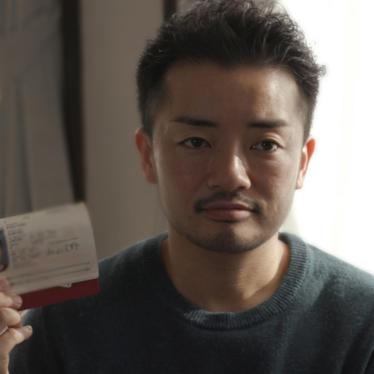Governor Hiroshi Ogawa, Fukuoka Prefecture
Tisato Kajiyama, Chairman, Board of Trustees, and President, Fukuoka Women’s University
Governor Ichita Yamamoto
President Yoshie Kobayashi, Gunma Prefectural Women’s University
Mayor Masanao Shibahashi, Gifu City
President Hiroyuki Sugiyama, Gifu City Women’s College
Governor Mieko Yoshimura
President Koji Abe, Yamagata Prefectural Yonezawa Women’s Junior College
CC: Minister Koichi Hagiuda
Ministry of Education, Culture, Sports, Science and Technology
3-2-2 Kasumigaseki, Chiyoda-ku, Tokyo 100-8959, Japan
Dear all,
We are writing on behalf of Human Rights Watch, an international human rights organization working in more than 100 countries around the world to document human rights violations and advocate for changes that respect and promote the human rights of all. We have had an office in Tokyo since 2009.
We write today to urge your universities, and the government of Japan to honor the self-declared gender identity of all, and to allow transgender women to enroll in all public women’s universities in the country. Over the past few years, as you may be aware, all two national women’s universities and two private women’s universities in Japan (Ochanomizu University, Nara Women’s University, Miyagi Gakuin Women’s University, and Japan Women’s University) have announced that they will begin to allow transgender students to matriculate at their institutions. This past June, President Satoko Shinohara of Japan Women’s University — the oldest and largest women’s university in Japan — has agreed, in the words of University President Satoko Shinohara — that “We’ll contribute to the realization of a society that embraces differences, where no one is treated unfairly” as the most recent of the four women’s universities to join the group.
By passing policy that respects the right to education of transgender women, these universities are acknowledging that transgender women have equal rights and should have the same opportunities to pursue higher education as everyone else. Your universities and the Ministry of Education should follow this example set by women’s universities and allow transgender women to matriculate at all public women’s universities, regardless of the gender marker on their identification document.
Currently, transgender people in Japan must undergo medical intervention and surgical sterilization in order for the government to legally recognize their gender. The Gender Identity Disorder Special Cases (GID) Act of Japan harms transgender people who want their gender legally recognized, but cannot or do not want to undergo irreversible medical procedures such as sterilization. The World Health Organization removed the diagnosis of “Gender Identity Disorder” from its diagnostic manual in 2019, stating that being transgender or gender-nonconforming is a natural variation of human experience and is not a mental health condition. Furthermore, sterilization requirements for legal gender recognition, such as in Japan, have been condemned repeatedly by human rights organizations and health experts, such as the World Professional Organization for Transgender Health (WPATH).
Additionally, the law mandates the earliest that transgender individuals can have their gender legally recognized is when they reach the age of majority, 20 years old. In essence, this means university students who are transgender women are not even eligible for their gender to be legally recognized while they are of typical university age. It is therefore critical that Fukuoka Women's University, Fukuoka prefecture and the ministry provide guidance to allow transgender students to attend universities according to their gender identity.
Some institutions in Japan have indicated they understand the importance of legal gender recognition without the requirement of surgery. In February 2018, two Supreme Court justices highlighted the need to reform Japan’s law: “The suffering that [transgender people] face in terms of gender is also of concern to society that is supposed to embrace diversity in gender identity.” This concurring opinion was written in response to the case brought by a transgender man who had challenged the GID Special Cases Act on the grounds that the requirement of gonadal surgery violated Japan’s constitution. The judges also noted that “because gender is treated as one of the attributes of an individual in social life and in personal relationships, it can be said that gender is inseparable from the existence as a person of an individual.” They concluded that for transgender people, being “able to receive rulings of changes in recognition of gender status… is an important, perhaps even urgent, legal benefit.” While the Supreme Court has not invalidated the law, the analysis in this judgment offers a significant critique that should be taken into consideration.
The right to education is a fundamental right for all people, including sexual and gender minorities. A 2016 Human Rights Watch report found that LGBT students in Japanese schools face physical and verbal abuse, harassment, and frequent insults from both peers and staff. Shortly after the release of the report, in March 2017 Japan updated its national bullying prevention policy which, for the first time, offered protection to sexual and gender minority students. MEXT has been a leader on lesbian, gay, bisexual, and transgender rights by mandating that schools should prevent bullying of students based on their sexual orientation or gender identity by “promot[ing] proper understanding of teachers on…sexual orientation/gender identity as well as mak[ing] sure to inform on the school’s necessary measures regarding this matter.” The policy follows MEXT’s 2015 directive describing accommodations schools should make regarding transgender students and other sexual minority students, and MEXT’s guidebook for teachers about LGBT students, which signaled an evolving view on LGBT rights and recommended several protective measures for LGBT students.
Japan’s legal gender recognition law creates significant discriminatory barriers for students who want to access education according to their gender identity. The procedure’s rigid requirements and the limited information available to children means the process of becoming legally recognized can be fraught with anxiety, coercion, and fear for the future. According to a 19-year-old transgender man from Tokyo that Human Rights Watch interviewed:
In high school, being able to be comfortable and express myself depended more on the social attitudes around me, so I decided I didn’t need to pursue the rest of the medical procedures in order to be happy.… Plus I don’t want to get surgery—it would cost lots of money and do bad things to my body.
He explained how he feared that he would need to undergo the medical procedures prescribed in the law in order to be employed. “I’m not sure what my future will be,” he said. I want to be a teacher but I don’t want to complete the legal gender recognition requirements and I’m not sure if a school will hire a teacher with discordant papers.”
Until the Japanese government reforms the GID Act, your universities and the Ministry of Education should acknowledge the self-proclaimed gender of all individuals at its public universities, and permit transgender women to enroll at its public women’s universities.
In 2018, Tokyo’s municipal government passed a bill that prohibits discrimination against lesbian, gay, bisexual, and transgender (LGBT) people. The new law states that the city government, citizens, and enterprises “may not unduly discriminate on the basis of gender identity or sexual orientation.” It requires the government to “conduct measures needed to make sure human-rights values are rooted in all corners of the city and diversity is respected in the city.” In doing so, the city is demonstrating its commitment to equal rights for all.
As you are aware, LGBT rights issues have gained prominence in public conversations and mainstream politics in Japan in recent years. We hope that your universities follow this trend by starting to play a leadership role and MEXT can continue its leadership role in supporting the right to education for all by instituting a policy to direct all universities in Japan must recognize the self-declared gender identity of students.
We would greatly appreciate learning what steps you have taken to address this important issue. Please contact us if you would like to discuss these issues further.
Sincerely,
Kanae Doi
Japan Director
Graeme Reid
Director of the Lesbian, Gay, Bisexual and Transgender Rights Program







